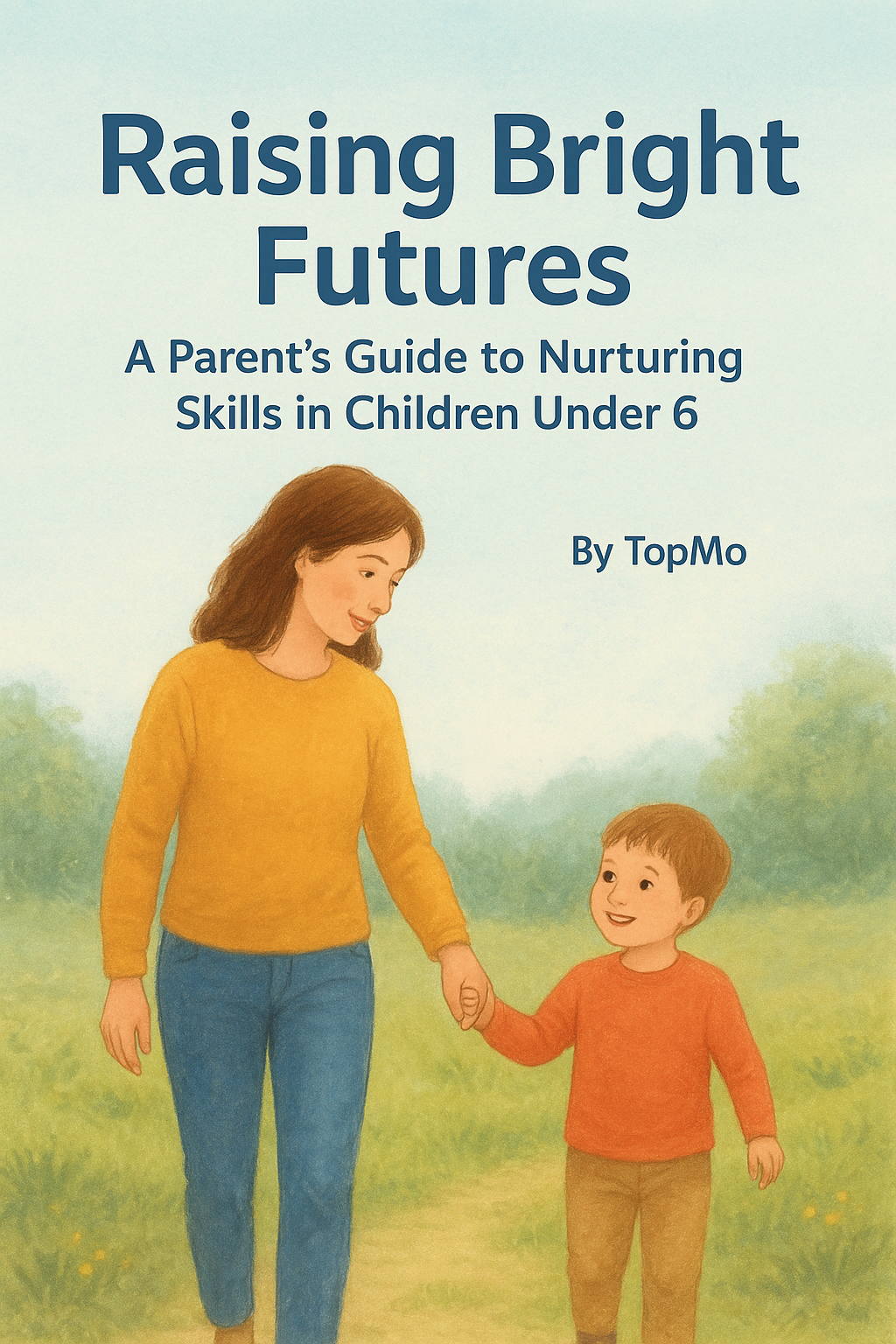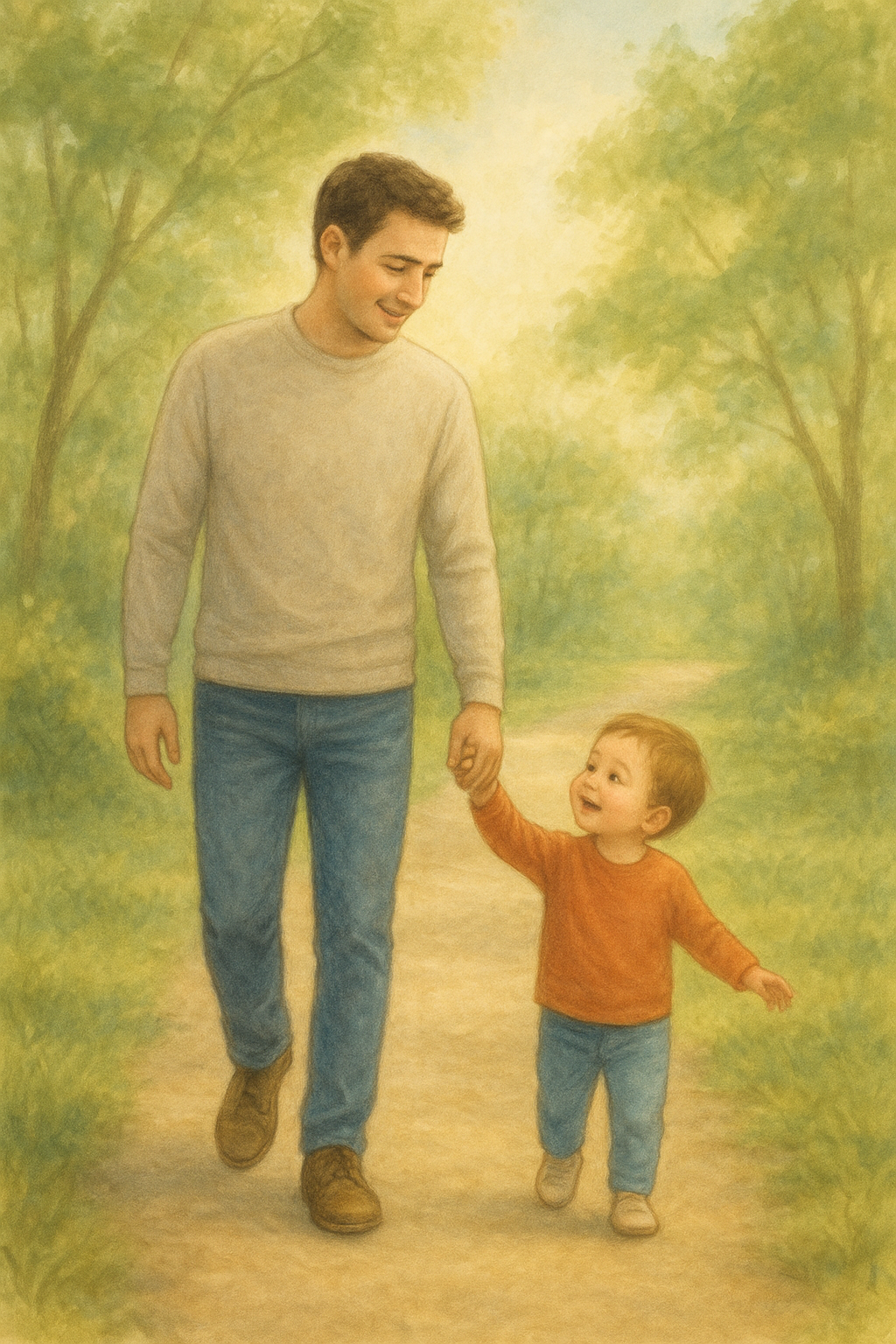Topmoltd
📘 Raising Bright Futures: A Parent’s Guide to Nurturing Skills in Children Under 6
📘 Raising Bright Futures: A Parent’s Guide to Nurturing Skills in Children Under 6
Couldn't load pickup availability
🌟 Introduction: Why the Early Years Matter
The first six years of a child’s life are often called the “golden years” — a time when little brains are developing faster than at any other stage. Every laugh, every game, every story, and even every struggle helps shape the person they will become.
As parents, it’s easy to feel the pressure — Am I doing enough? Should I be teaching letters? What if my child isn’t speaking as fast as others? Take a breath. You are your child’s first teacher, and the most important thing you can give them is love, attention, and opportunities to explore.
This guide will walk you through the essential skills children need before age 6 — communication, social-emotional growth, physical abilities, creativity, and school readiness — all while keeping parenting warm, playful, and manageable.
👉 Quick Exercise: Tonight, before bedtime, spend 5 minutes asking your child what their favorite part of the day was. This simple conversation builds language, memory, and emotional awareness.
🧠 Chapter 1: Understanding Early Childhood Development
Children grow at different paces. Some walk early, some speak late. What matters most is that they are progressing, exploring, and connecting with the world.
Key Milestones (approximate):
-
By age 2: 50+ words, running, simple pretend play.
-
By age 3: Short sentences, taking turns in play, drawing circles.
-
By age 4: Asking “why” questions, hopping, dressing themselves.
-
By age 5: Storytelling, counting to 10, basic problem-solving.
Every child develops in their own rhythm. Avoid comparing them to others — instead, celebrate the small wins.
👉 Exercise: Keep a “Milestone Journal.” Each month, jot down one new skill or funny phrase your child has learned. Over time, you’ll see incredible growth.
🗣️ Chapter 2: Building Communication & Language Skills
Language is the foundation of learning. Talking, listening, singing, and reading together all help wire the brain for future success.
Simple Tips:
-
Narrate your day: “We’re washing the red cup. Now we’re pouring water.”
-
Read daily: Even 10 minutes at bedtime makes a big difference.
-
Ask open questions: Instead of “Did you have fun?” try “What game did you like best?”
👉 Exercise: Play “Name 3.” Ask your child: “Can you name 3 animals?” or “3 things that are red?” This builds vocabulary, memory, and quick thinking.
❤️ Chapter 3: Developing Social & Emotional Intelligence
Emotional skills are just as important as ABCs. A child who can share, wait, and express feelings will thrive in school and friendships.
How to help:
-
Label emotions: “I see you’re sad because the toy broke.”
-
Model calm: Kids copy us more than they listen to us.
-
Encourage kindness: Praise when they share or help.
👉 Exercise: Create a “Feelings Chart” with faces (happy, sad, mad, surprised). Ask your child each evening to point to how they feel. This builds self-awareness.
🏃 Chapter 4: Motor Skills & Physical Growth
Young children learn best through movement. Active play builds not only muscles but also coordination and focus.
Activities for Gross Motor Skills (big movements):
-
Running races in the yard
-
Dancing to favorite songs
-
Pretend animal walks (hop like a frog, waddle like a duck)
Activities for Fine Motor Skills (small movements):
-
Stringing beads or pasta
-
Playing with playdough
-
Drawing, coloring, or using safety scissors
👉 Exercise: Set up a “Mini Obstacle Course” at home with cushions, chairs, and tunnels (blankets over chairs). This boosts balance, problem-solving, and confidence.
🎨 Chapter 5: Creativity & Imagination
Creativity isn’t just about art — it’s problem-solving, curiosity, and innovation. Children naturally have vivid imaginations. Our role is to nurture it.
Ways to Spark Creativity:
-
Provide open-ended toys (blocks, clay, dress-up clothes).
-
Let them get messy with paint, sand, or water play.
-
Encourage pretend play (shops, doctors, superheroes).
👉 Exercise: Try a “What if?” game: “What if we lived on the moon?” or “What if cats could talk?” Let your child invent wild answers — it stretches imagination and language skills.
📚 Chapter 6: Preparing for School Readiness
School readiness isn’t just knowing ABCs — it’s about confidence, independence, and curiosity.
Key Skills:
-
Self-help: dressing, washing hands, using the toilet.
-
Basic academics: recognizing letters, numbers, shapes.
-
Following routines: listening to simple instructions, waiting turns.
👉 Exercise: Make “School Pretend Play.” Take turns being the teacher and student. Practice sitting for story time, raising hands, and tidying up. This makes the real transition smoother.
🌱 Chapter 7: Parenting Mindset & Balance
Parenting under 6 can be exhausting. Remember: you don’t need to be perfect — just present. Children learn resilience, patience, and kindness most from how we handle daily life.
Tips for Parents:
-
Pause before reacting: A deep breath can save many tears.
-
Model what you want: Kids copy manners, tone, and habits.
-
Take care of yourself: A rested, calm parent creates a calmer child.
👉 Exercise: Each night, write down one thing you did well as a parent today. It might be reading a story, giving a hug, or staying calm. Over time, this builds your own confidence too.
🌟 Conclusion: Raising Confident, Kind, and Capable Kids
The years before six fly by quickly. These aren’t just years of preparation — they are years of joy, discovery, and growth. By talking, playing, creating, and loving, you are shaping not only your child’s brain but also their heart.
Parenting is never perfect, but with warmth, patience, and playful guidance, you’re raising a bright future.
Share




